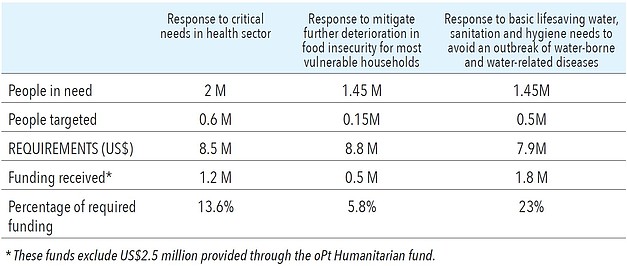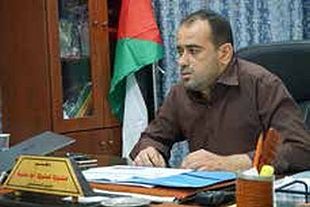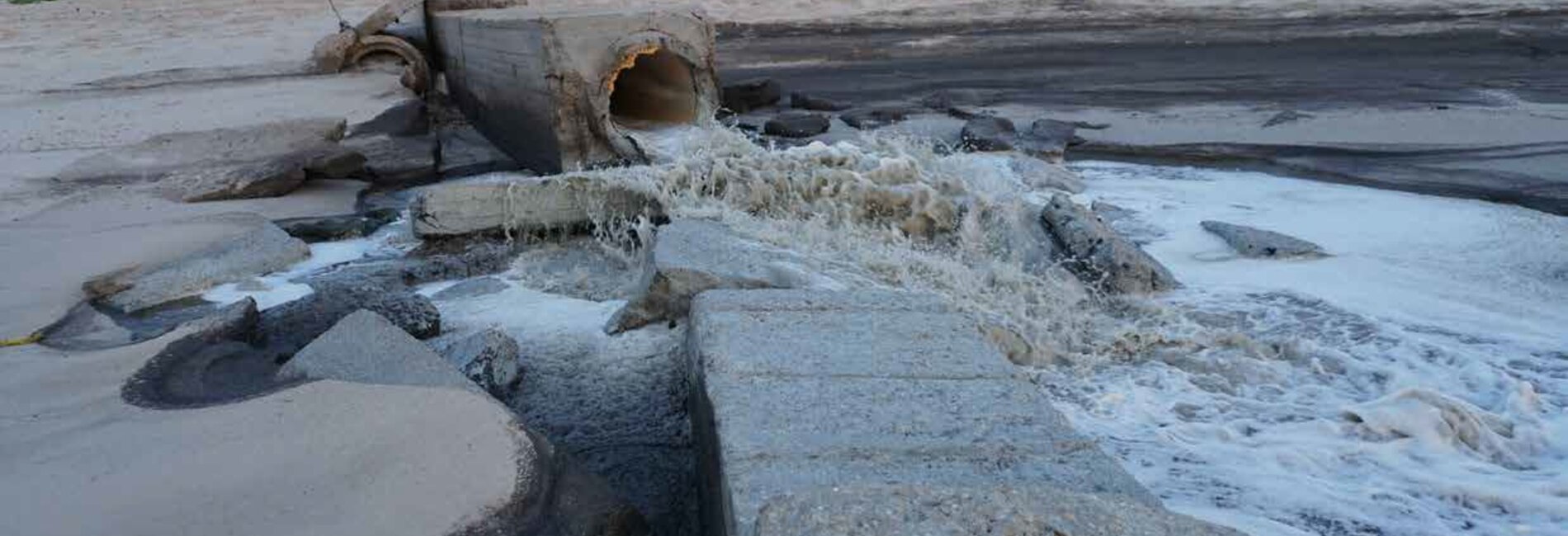Appeal for funding to stabilize Gaza’s deteriorating humanitarian conditions
In July, humanitarian agencies in the occupied Palestinian territory (OPT) appealed to the international community to provide US$25 million in humanitarian funding for urgent lifesaving interventions to stabilize the situation in the Gaza Strip.
At the centre of the crisis is an escalation in internal Palestinian divisions that exacerbated the existing energy crisis and resulted in energy outages of 18-20 hours a day since April 2017, up from 8-12 hours previously [for details see “Further deterioration” box]. The power shortage has taken an acute toll on the availability of essential services for two million residents, including health, water and sanitation services. Critical facilities have maintained minimal operation with emergency fuel provided by humanitarian agencies to run backup generators and vehicles. However, unless additional funds are raised, these fuel deliveries will be discontinued in the coming weeks. The shortage of electricity and fuel is also undermining Gaza’s fragile economy, particularly the manufacturing and agricultural sectors.
In addition, the salary crisis in the public sector, also linked to internal Palestinian divisions, has worsened. In March 2017, the West Bank-based Palestinian Authority (PA) cut the salaries of some 62,000 employees in Gaza by 30-50 per cent, and in early July, reportedly decided to refer over 6,000 civil servants for early retirement. If implemented, this will further undermine the provision of basic services. Additionally, since 2014, about 22,000 employees recruited by the Hamas authorities have received less than half of their salaries on an irregular basis. The direct impact on staff and families also spreads to the wider economy as a result of declining consumption.
The appeal addresses urgent needs in three key sectors: health, water and sanitation, and food security. All except one of the proposed interventions were already part of the Humanitarian Response Plan (HRP) launched in December 2016, but could not be implemented due to lack of funding.
Some interventions aim to secure fuel to operate backup electricity generators for hospitals and for 130 critical water and sanitation installations, as well as providing spare parts and maintenance for critical machinery, including generators. To prevent the outbreak of water-borne diseases and respond to the heightened risk of diarrheal disease outbreaks, other interventions seek the provision of chemicals for water treatment and hygiene kits for very vulnerable households. The funding also targets shortages in medical supplies and includes assistance to food-insecure families and vulnerable farmers whose livelihoods are under threat.[1]
A month after the release of the appeal, $3.5 million had been raised in donations from the USA, Canada, Japan, the Islamic Development Bank and private donors. An additional $2.5 million will be allocated to various projects in the appeal by the OPT Humanitarian Fund (HF) in the coming weeks. The HF, which is administered by OCHA and supported by Belgium, Germany, Ireland, Norway, Spain, Sweden, Switzerland and Turkey, allows for the rapid and flexible allocation of funds in response to unforeseen circumstances. As of 3 August, these combined allocations form 24 per cent of the funding sought by the appeal.

Further deterioration in electricity supply
In mid-April 2017, Gaza’s sole power plant (GPP), which had been producing a third of all the electricity supply to Gaza, was forced to shut down completely after exhausting its fuel reserves. This occurred due to a dispute between the Palestinian authorities in Ramallah and Gaza over the funding and taxation of fuel for the GPP. The situation was compounded in May following the Ramallah-based government’s decision to cut its payments for electricity provided to Gaza by Israel, previously some 60 per cent of the total supply. As a result, Israel reduced its supply by 33 per cent in late June. Around the same time, the Hamas authorities in Gaza arranged with the Egyptian authorities to import fuel from Egypt at a lower price than from Israel, allowing the GPP to resume partial operations. This resumption only compensated for the loss of supply from Israel. Furthermore, direct supplies of electricity from Egypt (previously some 7 per cent of the total supply) were partially/totally disrupted since April due to the technical malfunctioning of feeder lines and the inability to repair them. As a result, outages continued at 18-20 hours a day during most of this period, occasionally increasing to up to 22 hours a day.
Impact of the crisis on the health sector
In response to the electricity crisis, health providers have adopted negative coping mechanisms that include the postponement of elective surgeries, discharging patients prematurely, and limiting sterilization and laundry services to coincide with the times electricity from the grid is available (4-6 hours per day). The latter have a direct impact on the prevention of infections in hospitals. Electricity disruptions have also caused the malfunctioning of medical equipment, including the MRI scanner at Shifa, Gaza’s largest hospital. Backup generators, which are not designed to operate continuously, are also repeatedly in disrepair.
Essential medicines are hard to come by. An estimated 36 per cent of essential medicines and 32 per cent of medical supplies are at zero stock levels (less than four weeks of reserves) or completely depleted.
Patients requiring treatment outside of Gaza are increasingly affected. In recent months, the Hamas authorities have reported prolonged delays in financial approval for referrals outside Gaza by the West Bank-based Ministry of Health. Access by patients with financial cover to hospitals outside Gaza has also been impeded by the Israeli authorities. On average in the first half of 2017, more than half (53 per cent) of all applications for permits to exit Gaza through Erez checkpoint on medical grounds were denied or delayed by the Israeli authorities, according to the Palestinian Ministry of Health.
Two-year-old boy dies following prolonged delay in his referral
 Forty-three-year old physician Mohammed Abu Selmia has been Head of al-Rantisi Hospital for Children for the past seven years. When asked about the impact of the electricity blackouts on the hospital’s operations, Dr. Abu Selmia, explained:
Forty-three-year old physician Mohammed Abu Selmia has been Head of al-Rantisi Hospital for Children for the past seven years. When asked about the impact of the electricity blackouts on the hospital’s operations, Dr. Abu Selmia, explained:
“The situation at the hospital is extremely sensitive. A few days ago the electricity went out and the backup generators did not work immediately, causing a 15-minute blackout. It was disastrous! All personnel working in the hospital rushed to the intensive care unit to manually pump air to patients who cannot breathe independently in order to save lives.”
On 28 May 2017, a two-year-old boy suffering from a rare kidney disease was admitted to the hospital. Two days later (30 May), a referral request for the boy to be treated in the West Bank was sent to the Ministry of Health, based in Ramallah, because the hospital could not provide him with the necessary treatment. The child’s situation deteriorated quickly and he became completely dependent on a respirator to breathe.
“On 27 June 2017, I visited the toddler, took a photo of him and of the referral request, and published them on my own Facebook page. I received many calls after that stressing the importance of referring the boy abroad. I personally called Israeli hospitals as well, in vain. The toddler could not survive longer and passed away a few hours later. Referral abroad would have saved his life.”
Dr. Abu Selmia had contacted the Ministry more than once to urge them to expedite the process but no response to the referral request was received.
“I feel helpless for being unable to help my patients and alleviate their pain. The health situation is on the brink of a real disaster.”
[1] See Appeal for funding to stabilize Gaza’s deteriorating humanitarian conditions at https://www.ochaopt.org/content/gaza-crisis-urgent-funding-appeal










